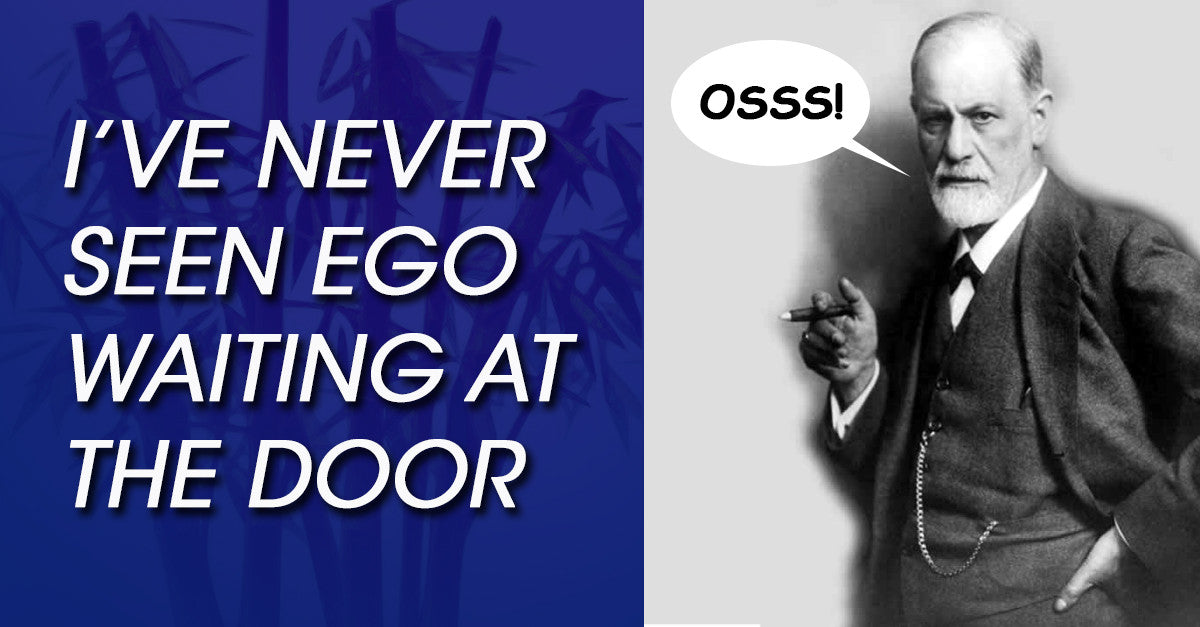I’ve Never Seen Ego Waiting at the Door

Many jiu-jitsu schools have a motto—sometimes unwritten but often scrawled on the wall as well—that goes “Leave your ego at the door.” The sentiment is sincere, and the intention seems to be one of encouraging students to be humble and to have an open mind. Almost anyone would agree that these are valuable traits to have in your gym culture, but the idea that anyone, anyone at all, is leaving their ego at the door is naïve. As much as we want to believe that jiu-jitsu is a great equalizer and that our sport is overflowing with positivity, we should be honest with ourselves about our very human shortcomings.
Instead of acting like everyone on the mat is leaving their ego behind, we should accept that our egos are very much a part of our training and how we interact with our partners. We’re much better off addressing ego head-on instead of acting like it’s not there.
For my part, I spent March and April trying new gyms. I’m super socially awkward to begin with—like please don’t make me actually call anyone on the phone because that makes me really uncomfortable so let’s just email, okay?—but I’m also a brown belt, and I’m also recovering from two major surgeries. I came back from a hernia repair only to blow out a knee soon after, so my physical capacity is still pretty limited. Add that to a year layoff, and, well, I feel pretty terrible on the mat. I can recall times as a blue belt when I felt sharper and more technical.
And here I am walking into a new gym with a brown belt. It’s embarrassing in some respects because I can’t roll how I think I should roll, and oh hey that’s my ego following me in the door, isn’t it?
Yes, it is. And that ego of thinking I should be performing at a certain level has made the process of simultaneously coming back to jiu-jitsu while also being the new guy a special challenge. I feel like I have something to prove, and I’m also semi-terrified of having to call my wife and telling her to pull the crutches out of the closet again.
The other end of this are the instructors and students who have welcomed me into their gyms. There’s the usual sideways glances at my brown belt from hungry blue and purple belts, and those sideways glances can turn into tough rolls if I catch the wrong trainer partner at the end of a long class. And that right there is another example of ego: Wanting to test yourself against someone who outranks you on paper.
Is my expression of ego unhealthy? Are the new jiu-jiteiros that I’m meeting expressing ego in an unhealthy way?
Not necessarily, and this is where I think as a community we might be looking at ego incorrectly. We assume that by default ego is a terrible thing, but we need it, and if accept that it’s there we can express it in a healthy way and perhaps use it to make us better grapplers.
My journey back to being semi-healthy isn’t over, but as hard as it has been, it’s been good for me. Facing my fear of going into new gyms and trusting strangers with my health has forced me to think about my training differently and to be more mindful of how I treat my training as well as my training partners. I’ve gotten to meet a lot of great new grapplers, and I’ve had to humble myself. I’m still embarrassed by my ability and conditioning, but I’ve learned that it’s a lot like tripping on stage. You can either slink off into the shadows in a fit of shame and regret, or you can own the misstep, laugh it off, and get on your day.
The latter takes more practice and is harder, but it’s better for you I think. It is how it is, so make the best out of it rather than sinking into self-loathing.
And as for the egos of the people I’ve met training: I get it. Of course a young purple belt wants to see how they measure up. Of course people will look at an upper belt with competitive excitement. By default, this behavior is not necessarily malicious. It’s technical curiosity. Sure, it’s driven by ego (isn’t all competition?), but instead of being salty about it, how about we just address it and have a healthy dialog about it?
“Hey, man. I’m coming back from some injuries, so go ahead and work your game, just give me a chance to tap. That’s all I ask.”
And that typically does the trick. It acknowledges their interest in being competitive while at the same time protecting my own interests.
So maybe instead of trying to leave our egos at the door, how about we try to understand them and tame them? They aren’t going away, and ignoring them won’t help us be better grapplers or training partners. Let’s address them head-on, personally and with our training partners, and try to find healthier, more productive ways to train with each other.
Other articles:
Quick links
Contact us
About us
Quality BJJ gear at fair prices, available all year. Founded in 2012 to provide an alternative to high-cost, limited edition gis. Dive into the BJJ lifestyle with us—join the Panda Nation!"
